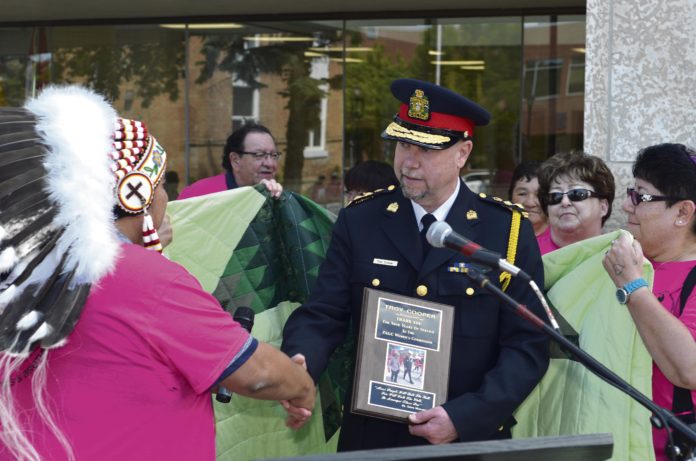
Troy Cooper may have moved on to lead the Saskatoon Police, but his work with the Prince Albert Police Service has not been forgotten.
He returned to P.A. Thursday to participate in the Prince Albert Grand Council’s (PAGC) annual walk for missing and murdered Indigenous men and women. But the organizers surprised Cooper with a gesture of their own.
Prior to the walk, he was presented with a plaque with a photo of him participating in a previous event, thanking him for his years of service to the PAGC Women’s Commission. He was also draped in a star blanket.
Prior to the presentation, Cooper thanked the PAGC for helping him grow as an officer.
“I’ve participated in this walk many times, and it’s been an important part of my growth, as someone who is sworn to protect people,” he said.
“It was important to me because of who I walked with.”
He mentioned his time walking alongside representatives from the FSIN, the PAGC, the municipal and provincial governments.
“Most importantly, I have been able to walk with community members and members of families who have been impacted by loss I think that is what has made the biggest difference in my life,” he said.
“Being allowed to participate in their grief, bonding with that tragedy. When we stop and talk about people that are missing, and we hear their stories, they don’t remain in my mind as a statistic. At my desk most of the day I read about percentages and numbers. But when you listen to the family members and you hear their stories, and they’re hard stories to hear, you’re reminded that these are not numbers. They’re families, they’re people, they’re our neighbours., they’re our relatives, they’re our own family members. It becomes very real.”
As the walk journeyed from stop to stop, families got an opportunity to share their experiences. Outside the Court of Queen’s Bench, the family of Happy Charles spoke. They talked about their struggles, how police didn’t believe them at first, but also about how one of the first to take them seriously was Cooper.
In his speech, Cooper spoke about what needs to be done from the justice system, and from his police force, to make a difference.
“I’ve seen firsthand the flaws in (the justice system). I know the police are not the whole justice system, but we have a role to play there,” he said.
“I think it’s our challenge as police officers, our challenge and commitment to remove social status, to remove race and to remove gender from how we perform our duty. Those things aren’t risk factors; they shouldn’t determine a police response. Our biggest fault has not been how we’ve responded. It’s been the lack of our response — it’s been apathy.”
Cooper concluded his remarks by, again, thanking the community where he policed for several years.
“We know all people are valuable,” he said, “and we have to be sure that we care as police officers and we notice what’s happening. Thank you as a community for what I’ve been taught, for making me a better leader, and making me a better person.”

